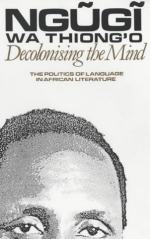|
This section contains 888 words (approx. 3 pages at 400 words per page) |

|
Summary
Chapter 1 consists of seven parts. In Part I of Chapter I, Ngũgĩ identifies the various social forces that have made the language of African literature into an issue and a problem. On the one hand, imperialism controls the economy, politics and cultures of Africa, and has thus tried to dominate its language too. On the other hand, the people have continuously struggled to “seize back their creative initiative” (4) and to take back control of the means to “communal self-definition in time and space” (4). Ngugi argues that the choice and use of language is central to a community’s ability to define itself.
History begins in 1884, with the partition of Africa at the Berlin conference, which he compares to the more recent conferences at the end of World War II. These border-drawing conferences create not only economic...
(read more from the Chapter 1 (Parts I-III): The Language of African Literature Summary)
|
This section contains 888 words (approx. 3 pages at 400 words per page) |

|




